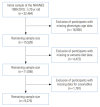Association of the dietary inflammatory index with phenotypic age in the United States adults
- PMID: 37170498
- PMCID: PMC10593589
- DOI: 10.4178/epih.e2023051
Association of the dietary inflammatory index with phenotypic age in the United States adults
Abstract
Objectives: One of the underlying mechanisms of aging is chronic inflammation, which has been closely associated with daily diet. Phenotypic age (PhenoAge) has been used as an index to track the aging process before diseases show clinical symptoms. The present study aimed to explore the association between the dietary inflammatory index (DII) and PhenoAge.
Methods: In total, 9,275 adults aged 20 years old and over in the National Health and Nutrition Examination Survey were involved in this study. Dietary patterns were classified as pro-inflammatory or anti-inflammatory according to the DII. PhenoAge was regarded as a continuous variable, and linear regression was used to explore its association with dietary inflammation. Stratified analyses by sex, age, race, physical exercise, smoking status, drinking status, and body mass index were used to test the sensitivity of these associations.
Results: The median value of PhenoAge was 38.60 years and 39.76 years for the participants with anti-inflammatory and pro-inflammatory diets, respectively. A pro-inflammatory diet was positively associated with PhenoAge (β=0.73; 95% confidence interval, 0.31 to 1.14), compared with participants who had an anti-inflammatory diet. There was an interaction between dietary inflammation and age for PhenoAge (pinteraction<0.001). The strength of the association between a pro-inflammatory diet and PhenoAge was stronger as age increased.
Conclusions: A pro-inflammatory diet was associated with a higher PhenoAge, and the association was strongest in the elderly. We recommended reducing dietary inflammation to delay phenotypic aging, especially for the elderly.
Keywords: Aging; Elderly; Inflammation; National Health and Nutrition Examination Survey.
Conflict of interest statement
The authors have no conflicts of interest to declare for this study.
Figures


References
-
- Alburez-Gutierrez D, Kolk M, Zagheni E. Women’s experience of child death over the life course: a global demographic perspective. Demography. 2021;58:1715–1735. - PubMed
MeSH terms
LinkOut - more resources
Full Text Sources

